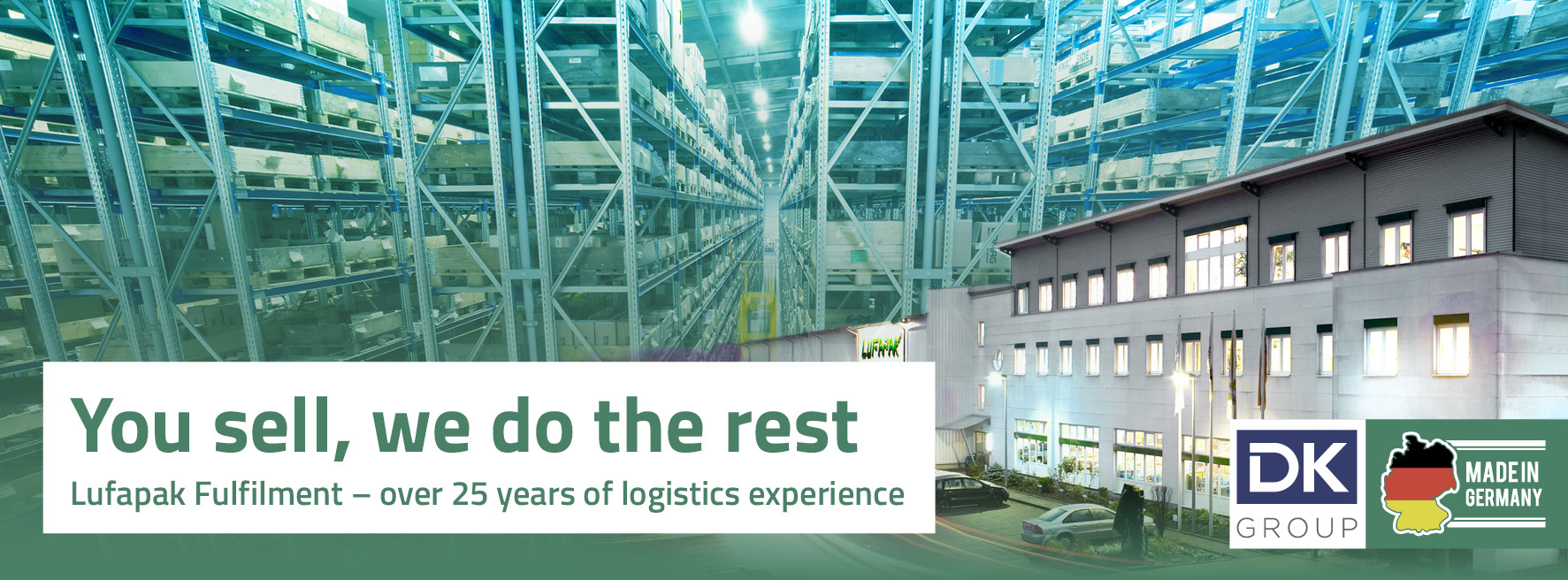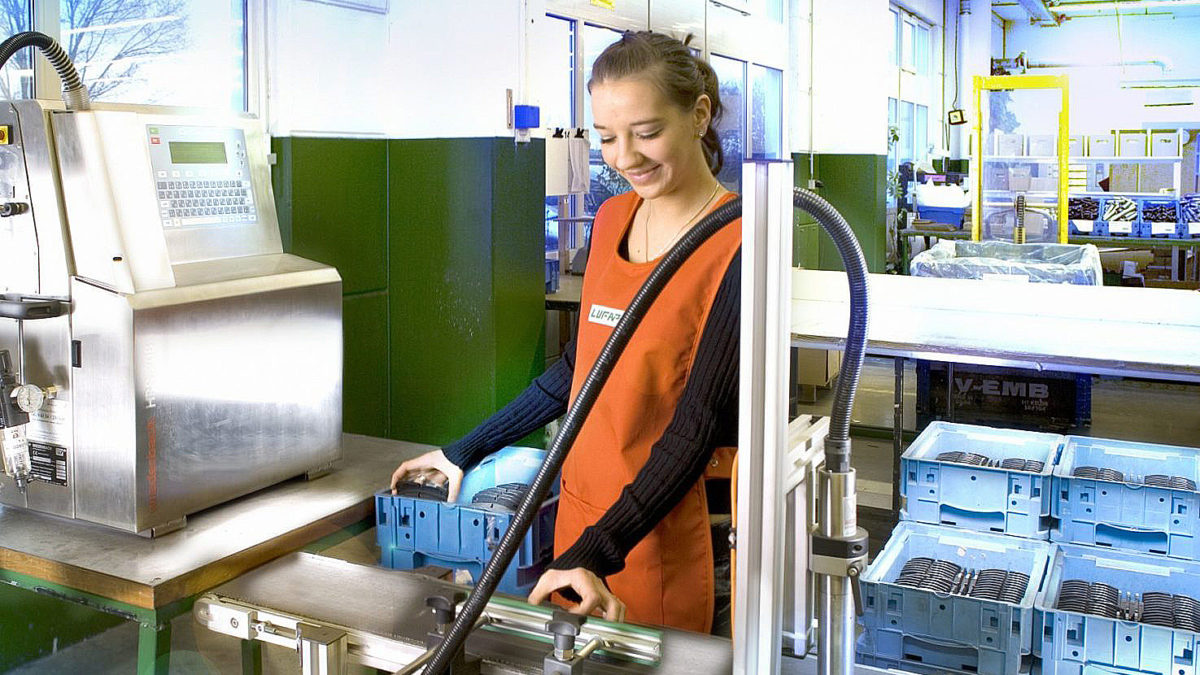sales@lufapak.de +49 2631/384-0 Contactform
A distribution center, also known as a distribution center or logistics center, is a type of warehouse used for storing and shipping goods. It serves as a central hub in a company’s supply chain where products are received from various suppliers, sorted and then shipped to various retail locations, wholesalers or directly to end customers.
Distribution centers play a critical role in logistics and supply chain management, helping to efficiently manage the flow of goods and ensure that the right products arrive at the right place at the right time. They can also perform additional functions such as packaging, labeling, inventory and quality control.
The role of distribution centers in modern logistics
Distribution centers play a central role in modern logistics and are indispensable for the efficient management of goods flows. Here are some of the main reasons why distribution centers are so important:
1. storage and organization of products: Distribution centers serve as storage locations for products. They are designed to hold a large amount of goods, and they are usually equipped with racking systems that allow for efficient organization and storage.
2. fast and efficient distribution: due to their central location, distribution centers can distribute products to different locations quickly and efficiently. This is especially important in today’s environment where customers expect fast delivery times.

3. processing of returns: Distribution centers also play an important role in processing returns. They receive returned products, check their condition and decide on further action (e.g. restocking, sorting out, repair).
4. quality control: quality checks are often carried out in distribution centers to ensure that all outgoing products meet standards.
5. cost efficiency: by bundling warehousing, distribution and other logistical functions in one place, distribution centers can achieve significant cost savings.
6. flexibility: distribution centers offer flexibility by enabling companies to quickly adapt their logistics strategy to changing market conditions.
The impact of automation on distribution centers
Automation is having a huge impact on distribution centers, changing the way they operate. Here are some of the key impacts:
1. increasing productivity: automated systems can operate around the clock, enabling continuous production. They increase the speed and efficiency of warehouse and picking processes and can help increase overall distribution center productivity.
2. improving accuracy: automated systems reduce human error in receiving, sorting and delivering goods. This can lead to greater accuracy in inventories and improved customer satisfaction.
3. reducing labor costs: automating tasks that were previously performed by humans can reduce labor costs. However, it is important to note that this can also lead to job losses and therefore needs to be carefully planned.
4. improving safety: Automated systems can take over tasks that are considered dangerous or difficult for humans, such as lifting heavy loads. This can help reduce the risk of workplace accidents and improve safety in the distribution center.
5. Flexibility: Modern automated systems are flexible and scalable. They can be adapted to changes in business operations, such as seasonal fluctuations or company growth.
6. space optimization: by using automated storage and picking systems, the available space in a distribution center can be used optimally.
However, it is important to note that the implementation of automation technologies requires a significant investment and must be carefully planned to ensure that it is profitable and delivers the desired results.
Distribution centers and supply chain management: an inseparable relationship
Distribution centers are an essential part of supply chain management. They act as hubs where goods are stored, sorted and then forwarded to the appropriate recipients. The relationship between distribution centers and supply chain management is inseparable, as the two are closely linked and work together to ensure the smooth movement of goods.
Supply chain efficiency: Distribution centers contribute to supply chain efficiency by optimizing the storage and transportation of goods. They enable companies to deliver their products to customers quickly and efficiently, resulting in improved customer satisfaction.
Inventory management: distribution centers play a crucial role in inventory management. They help companies keep track of their inventory and ensure that there are always enough products in stock to meet demand.
Cost savings: By centralizing warehousing and distribution in a distribution center, companies can save significant costs. This includes both the direct costs of warehousing and transportation as well as indirect costs such as administrative expenses or capital tied up.
Flexibility: Distribution centers offer flexibility in terms of warehousing and shipping goods. They enable companies to respond quickly to changes in demand or the market environment.
Overall, distribution centers are an indispensable tool for supply chain management. They help companies to design their supply chains efficiently and cost-effectively and thus achieve a competitive advantage. Without them, effective supply chain management would hardly be possible.
Green distribution centers: A step towards sustainability
Green distribution centers, also known as environmentally friendly or sustainable distribution centers, are an important step toward more sustainable logistics and supply chains. They are designed to minimize energy consumption, CO2 emissions and overall environmental footprint while providing efficient warehousing and distribution services.
Here are some of the features and strategies that characterize green distribution centers:
Energy efficiency: green distribution centers rely on energy-efficient technologies and practices, such as LED lighting, high-efficiency heating and cooling systems, or solar energy, to reduce energy consumption.
Sustainable building: They can also be designed according to sustainable building principles, with materials and construction techniques that minimize environmental impact. For example, the roof of a green distribution center may be covered with solar panels or green plants to generate energy or regulate the temperature in the building.
Waste management: Green distribution centers often implement comprehensive waste management and recycling programs to reduce the amount of waste that ends up in landfills.
Water conservation: You can also implement water conservation measures, such as using rainwater for irrigation or installing water-efficient plumbing systems.
Efficient logistics processes: Through the use of technology and data analytics, green distribution centers can optimize their logistics processes to reduce fuel consumption and emissions.
The future of distribution centers: What awaits us?
The future of distribution centers will be heavily influenced by technological developments. Here are some trends we are likely to see in the coming years:
1. automation: Automation will continue to play an important role as more and more tasks in distribution centers are taken over by robots and automated systems. This can range from automated warehouse and retrieval systems to self-driving forklifts and drones for internal transportation.
2. artificial intelligence (AI) and machine learning: these technologies are increasingly being used to optimize processes, make predictions and inform decisions. For example, they can help predict demand, optimize inventory, or determine the most efficient routes for transporting goods.
3. Internet of Things (IoT): IoT technologies enable distribution centers to collect real-time data from a variety of sensors and devices. This can help keep track of inventory, increase efficiency, and detect problems early.
4. Sustainability: Given the growing awareness of environmental issues, distribution centers are increasingly being designed to be more sustainable. This can include using renewable energy, improving energy efficiency, and reducing waste.
5. omni-channel logistics: As more companies adopt an omni-channel approach, distribution centers will play a key role in integrating different sales channels, from online shopping to traditional retail stores.
These trends show that distribution centers could become even more important in the future as they adapt and evolve to meet the changing needs of the logistics industry.
Use Lufapak as a distribution center for your company
Lufapak, as a logistics service provider, offers a wide range of services to meet the needs of different companies. One of our core offerings is the use of our distribution center for your company.
Here we take care of the storage, picking, packing and shipping of your goods.
By using our distribution center, you benefit from an efficient and cost-effective solution for your logistics processes.
An intelligent IT infrastructure enables us to process goods quickly and provides you with optimum transparency regarding stock levels and orders.
Thanks to our experienced team and state-of-the-art storage and picking technology, you can rely on a reliable solution.
Contact us and benefit from our distribution center as an addition to your business.
Contact us now and get advice


